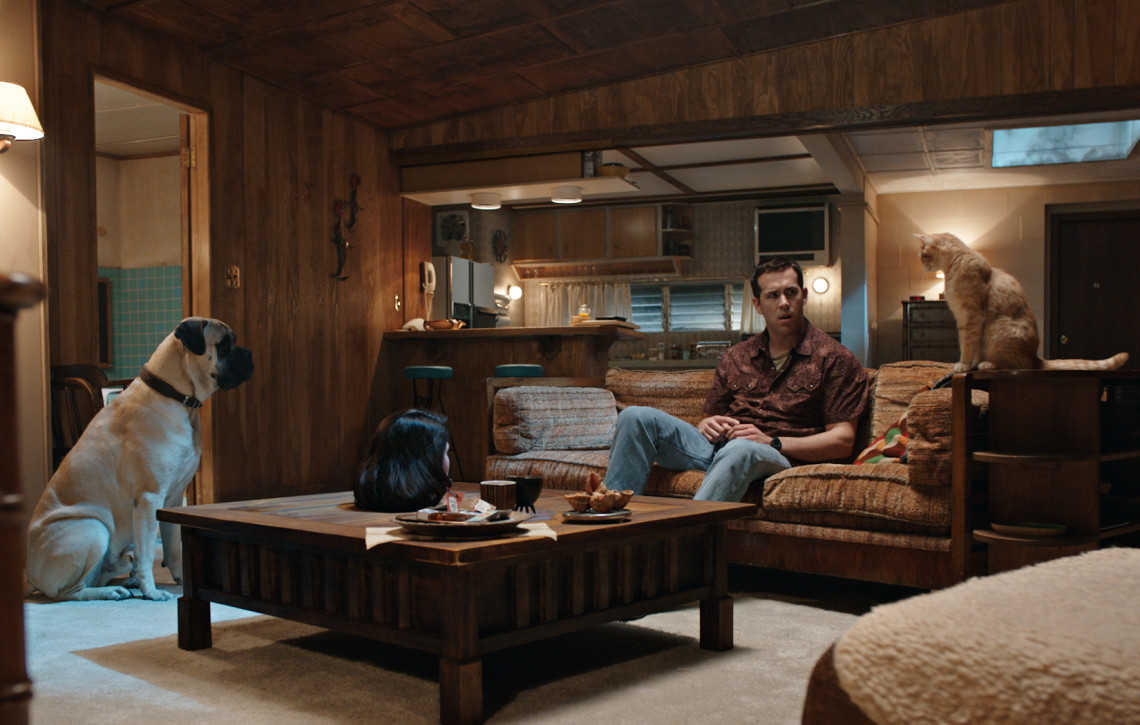There’s nothing wrong with talking to your pets. But if they start talking back, well, that’s a cause for concern. Such is the magical realist scenario director Marjane Satrapi explores in The Voices. Jerry (Ryan Reynolds) is an upbeat and peculiar factory worker who spends his time at home having conversations with his cat, an ill-mannered orange tabby named Mr. Whiskers, and his dog, a loveable bullmastiff named Bosco. The former tries to persuade his owner to kill people, while the latter offers soulful arguments against his feline counterpart’s truculence. It’s a weird movie on paper (and weirder still in practice), but The Voices’ most unexpected detail may be actually its behind-the-camera pedigree instead of its subject.
The Voices is the latest film from Iranian director Marjane Satrapi, perhaps best known for Persepolis, the screen adaptation of her graphic novel that she co-directed with Vincent Paronnaud in 2007. Whether on the page or on the screen, Satrapi’s work tends to focus on social outcasts and cultural tension, and typically circles back around to thoughts of her homeland. The Voices feels like a departure from her normal bent, then, with its slasher elements and ratcheting levels of insanity; it’s true that Satrapi’s films have their own quirky flair, but here, she plays in a new, though not entirely unfamiliar, sandbox of extremities. The Voices is character study of Jerry and his relentlessly cheerful but achingly isolated existence, which sounds much closer to her wheelhouse until he starts murdering people.
At that point, The Voices becomes a tonal juggling act, but if you’re willing to meet the film’s oddness head-on, you’ll be rewarded with a richly told yarn that’s as touching as it is gruesome. How many times can you recall being moved to empathize with a serial decapitator? Jerry lives in a derelict apartment fashioned atop a rundown bowling alley with Bosco and Mr. Whiskers (both voiced by Reynolds) for company. His only consistent source of human contact is his job, where his co-workers regard him distantly. They all know there’s something “off” with him. They just don’t know what that something is, and we’re given the honor of learning all about it.
The Voices goes deep on all the elements of Jerry’s tragic backstory, and in the process invites us to show the poor bastard a little bit of sympathy; even when Jerry is at his most volatile, we can still see him as a lonely person who’s terrified of being abandoned. This is a film that understands and grapples with mental illness on a very real and very personal level. It’s also a puzzling yet beguiling mélange of genre and intent, a horror-rom-com with a topical streak a mile wide running through it.
Another filmmaker might collapse under the weight of everything Satrapi balances here. Broken down into its component parts, The Voices feels like a bunch of different narratives on a collision course with one another; it’s a movie about a reclusive nutter who chats with his animal companions, keeps severed heads in his refrigerator, struggles with his familial psychosis, and strikes up an office romance with the shy cutie in accounting (Anna Kendrick, one of the most reliably, adorably charming actors on the planet) after being spurned by the English rose who first catches his fancy (an uproarious Gemma Arterton), all at the same time. But Satrapi uses that common thread of tragedy to marry each of these disparate elements together. When Jerry blinds himself to the hardships of his life by refusing to take his medications, the world becomes sunnier and more bonkers by far. When the film pierces that veneer, it grows darker (though no less bonkers). At all times, the film is about Jerry’s schizophrenia, which lends the film a remarkable sense of harmony.
Equally remarkable is Reynolds, who has never been better than he is here. Like Satrapi, Reynolds’ job in The Voices is to run the gamut; Jerry has so many sides as to make dodecahedrons jealous, and whether he’s in the throes of mania, flirting with the film’s co-leading ladies, talking psych with his therapist (Jacki Weaver, whose best scenes crop up in the last act), or musing over the human condition with Bosco and Mr. Whiskers, Reynolds makes the high-wire act work. The Voices has its share of shocks, but the greatest of all may be the combination of star and director. They mine harmony out of heartbreak and dysfunction.





















One thought on ““The Voices””
Pingback: Review: The Voices, 2015, dir. Marjane Satrapi | A Constant Visual Feast